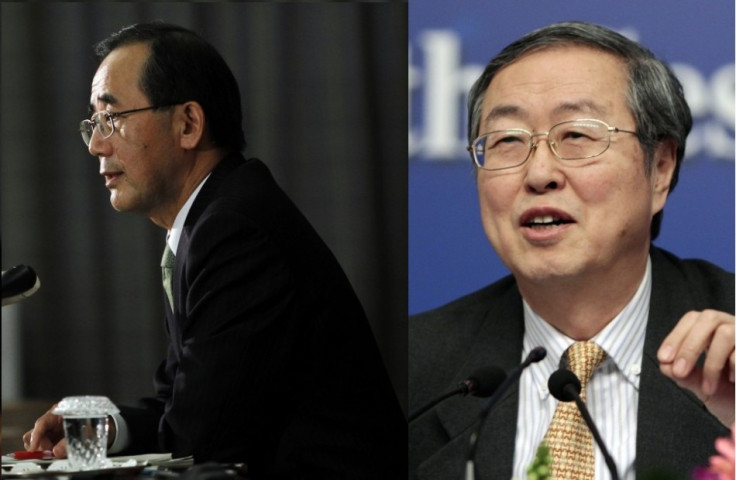Asia Loses Top Two Central Bankers As Shirakawa Quits, Zhou Prepares to Retire

The two most influential men in Asia's financial markets will step down next month leaving investors guessing as to how new central bank chiefs in China and Japan will steer two of the world's most important economies.
China's official financial news publication, the China Securities Journal, reported earlier this week that People's Bank of China governor Zhou Xiaochuan will leave his post in March after ten years at the helm of the nation's central bank. The news was followed by the early resignation announcement earlier Tuesday by Bank of Japan governor Masaaki Shirakawa, who steps down a month before his five-year term was due to expire.
Each departure has been largely telegraphed to financial markets - the 64-year old Zhou's name was omitted from the influential Communist Party Central Committee at the last major regime change in November, and Japan's new Prime Minister, Shinzo Abe, has made no secret of his desire to see the 63-year old Shirakawa out the door - but the leadership gap is likely to cause some concern as each economy navigates a new path to growth.
In China, that could include looser controls on interest rates and capital flows and potentially even more market-led fluctuation for the yuan. Zhou's ten year legacy at the PBOC is largely defined by his role in removing the peg that kept the yuan tied to the value of the US dollar in July of 2005.
The yuan has appreciated 23.4 percent against the greenback and China appears well on its way towards a so-called "price based" monetary policy regime that will fully replace the previous strategy of benchmark lending and deposit rates. It appears to be working, as well: China's growth has rebounded from a 13-year low and data points to comfortable expansion in the coming year.
What remains to be seen, however, is how much further Zhou's successor - two names floated as replacements include Shang Fulin, the country's top banking regulator and Guo Shuquin, who heads the China Securities Regulatory Commission - will push this path towards liberalisation.
In Japan, Shirakawa leaves after weeks of public and private disputes with Abe over the Prime Minister's strategy to revive growth and create jobs in the world's third largest - but largely dormant - economy. Abe has called for "bold" action from the central bank, including a significantly faster inflation target and deeper monetary stimulus.
Shirakawa has consistently warned that there is "no magic wand" to ending the two decades of deflation that has choked demand and strangled growth. He's reluctance to deliver on all of Abe's wishes was evident in the BoJ's decision last month to delay by a year its revised 2 percent inflation target. Abe had demanded a more immediate time frame.
Even with a recalcitrant governor, however, the yen has fallen 13 percent against the dollar over the past three months, helping to lift Japan's benchmark Nikkei 225 to a two year high. The broader Topix index has leaped more than 30 percent since Abe began publically advocating his economic strategy during his election campaign.
Asia Development Bank president Haruhiko Kuroda and former BoJ deputy governor Toshiro Muto are said to be among the short-listed candidates to replace Shirakawa.
Investors will now wish to know if Abe will appoint a pliant governor who's ready to cripple the value of the yen in a last-ditch effort to stoke demand or whether the next leadership will express the same degree of price control caution as the departing Shirakawa.
© Copyright IBTimes 2024. All rights reserved.






